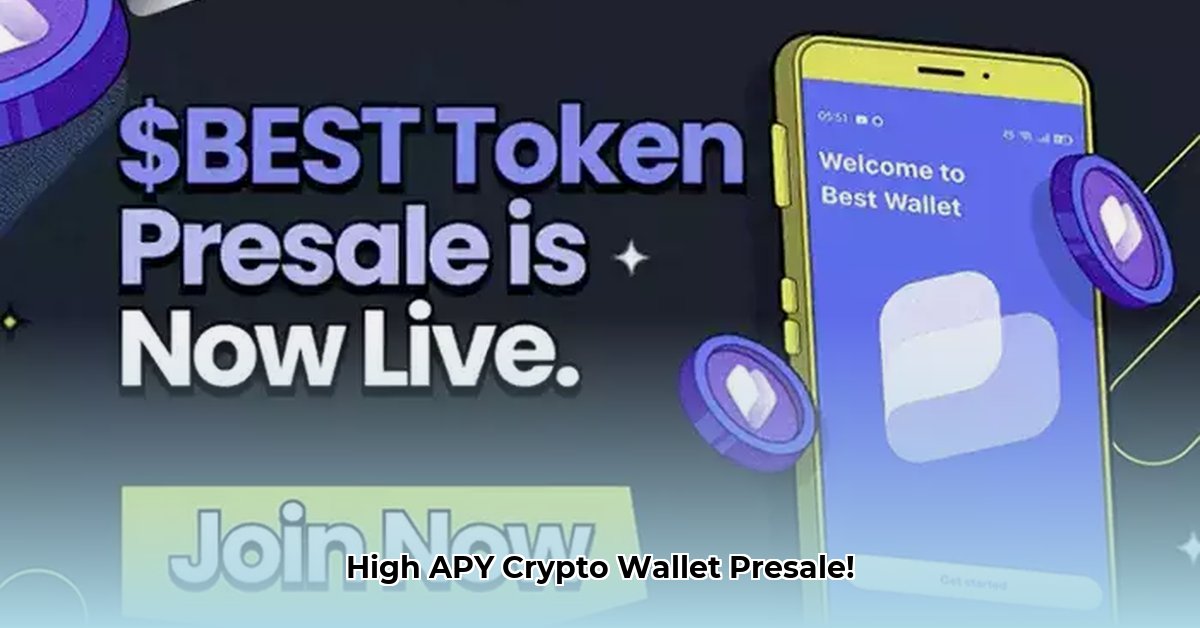
Thinking about participating in the Best Wallet presale? The promise of high-yield staking and a comprehensive crypto ecosystem is enticing, but due diligence is crucial before investing. This article provides an objective overview of Best Wallet, its $BEST token, and a competitive analysis to help you make an informed decision. We'll examine the platform's features, tokenomics, security, and inherent risks. No hype, just the facts.
Value Proposition: A Unified Crypto Experience?
Best Wallet aims to be a one-stop shop for cryptocurrency users. It envisions a platform where users can seamlessly buy and sell crypto, earn interest through staking, swap tokens via a decentralized exchange (DEX), and even spend cryptocurrencies with a linked debit card. The $BEST token acts as the keystone of this ecosystem, offering access to discounts and special features within the platform. But is this vision realistic, and what are the actual benefits?
Here's a breakdown of Best Wallet's core offerings:
- Simplified Crypto Trading: Buy and sell various cryptocurrencies directly within the wallet, avoiding the need for multiple exchanges. This simplifies the process for users, increasing accessibility.
- High-Yield Staking (Claimed): Earn passive income by staking supported crypto assets. Best Wallet claims high Annual Percentage Yields (APYs), but it's crucial to remember that these are not guaranteed and can change dramatically. Independent verification of these claims is currently lacking.
- Integrated DEX (Best DEX): Seamlessly swap different cryptocurrencies across multiple blockchains without needing to switch platforms. This streamlines trading and potentially reduces friction.
- Crypto Debit Card (Best Card): Spend your cryptocurrency holdings directly at millions of merchants worldwide that accept Visa. This convenience is a significant differentiator in the market.
- Early Access Opportunities: Presale investors potentially gain early access to new projects or investments through the Best Wallet ecosystem. This incentive aims to attract early adopters.
Competitive Analysis: Best Wallet vs. Market Leaders
The cryptocurrency wallet market is fiercely competitive. Established players like MetaMask, Trust Wallet, and Ledger Live have significant user bases and features. Best Wallet will need a compelling value proposition to stand out. The following table compares key aspects:
| Feature | Best Wallet | MetaMask | Trust Wallet | Ledger Live |
|---|---|---|---|---|
| Crypto Buying/Selling | Integrated | Requires third-party services | Requires third-party services | Requires third-party services |
| Staking | Integrated (High APY claimed, unverified) | Limited options | Limited options | Limited options |
| Decentralized Exchange (DEX) | Integrated (Best DEX), cross-chain support | No integrated DEX | No integrated DEX | No integrated DEX |
| Debit Card | Integrated (Best Card) | None | None | None |
| Fees | To be determined | Variable | Variable | Variable |
| Security | Fireblocks insurance, 2FA (claimed) | Robust security protocols | Robust security protocols | Hardware security, strong track record |
| User Experience | To be determined | Mature, widely used | User-friendly, mobile-focused | Secure, but steeper learning curve |
Disclaimer: This comparison is based on publicly available information and may not reflect future changes. Individual experiences may vary.
Tokenomics and Financial Model: Understanding the $BEST Token
The $BEST token is the lifeblood of the Best Wallet ecosystem. Its value is directly linked to the platform's success and adoption. Key aspects of the tokenomics, including total supply, distribution plan, and inflation rate, are crucial in assessing its long-term potential. However, critical details regarding these aspects are currently missing from publicly available information. The lack of transparency presents a significant risk factor for potential investors.
Risk Assessment: Navigating the Challenges
Investing in crypto presales, particularly in a highly competitive market like crypto wallets, carries significant risk. Key areas of concern include:
- Security Risks: While Best Wallet mentions Fireblocks insurance and 2FA, the absence of independent security audits is a major red flag. Independent audits are essential for verifying security claims and building investor trust. Without them, unknown vulnerabilities could exist. Is it wise to invest without fully understanding the security infrastructure?
- Regulatory Uncertainty: The regulatory landscape for cryptocurrencies is constantly evolving and varies widely across jurisdictions. Changes in regulations could significantly impact Best Wallet's operations and the value of the $BEST token.
- Market Volatility: Cryptocurrency markets are notoriously volatile. The value of the $BEST token could experience substantial fluctuations, potentially leading to significant losses for investors.
- Competitive Pressure: Best Wallet faces intense competition from established players with strong reputations and user bases. Success is not guaranteed.
Investment Considerations: A Cautious Approach
The Best Wallet presale offers a potential opportunity to acquire $BEST tokens at an early stage, possibly at a lower price than later. However, this is a highly speculative investment. Before committing funds, conduct thorough due diligence (DYOR): review the project's whitepaper, scrutinize the team's background and experience, and analyze the risks outlined above. Only invest funds you can afford to lose entirely. Diversification across multiple investments is always a prudent strategy to manage risk.
Conclusion: A Balanced Perspective on Best Wallet
Best Wallet presents an interesting concept—a unified crypto platform. However, the presale carries considerable risk, and the long-term success of both the platform and the $BEST token is not guaranteed. The lack of independent security audits and the absence of complete transparency around tokenomics are significant concerns. A thorough understanding of these risks is paramount before considering participation in the presale. Remember, the crypto space changes rapidly; continuous research is essential for informed decision-making.